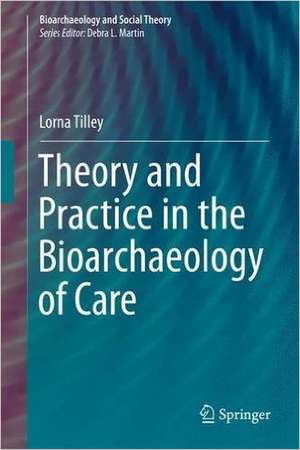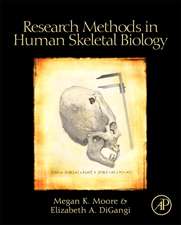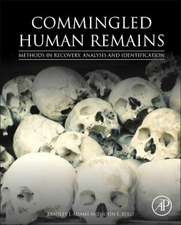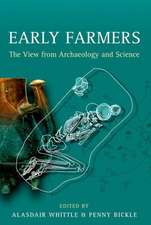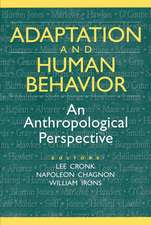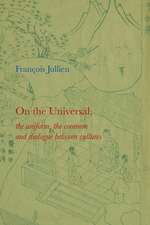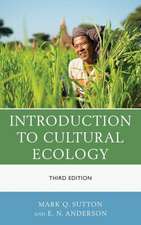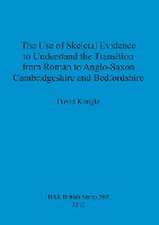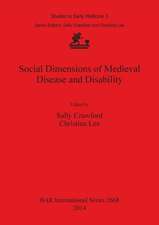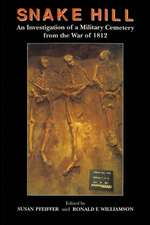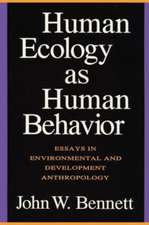Theory and Practice in the Bioarchaeology of Care: Bioarchaeology and Social Theory
Autor Lorna Tilleyen Limba Engleză Hardback – 11 sep 2015
| Toate formatele și edițiile | Preț | Express |
|---|---|---|
| Paperback (1) | 471.46 lei 38-44 zile | |
| Springer International Publishing – 22 oct 2016 | 471.46 lei 38-44 zile | |
| Hardback (1) | 538.76 lei 38-44 zile | |
| Springer International Publishing – 11 sep 2015 | 538.76 lei 38-44 zile |
Din seria Bioarchaeology and Social Theory
-
 Preț: 357.04 lei
Preț: 357.04 lei - 18%
 Preț: 732.70 lei
Preț: 732.70 lei -
 Preț: 394.12 lei
Preț: 394.12 lei - 18%
 Preț: 1117.34 lei
Preț: 1117.34 lei -
 Preț: 391.99 lei
Preț: 391.99 lei - 18%
 Preț: 738.06 lei
Preț: 738.06 lei - 15%
 Preț: 701.06 lei
Preț: 701.06 lei - 15%
 Preț: 585.57 lei
Preț: 585.57 lei - 18%
 Preț: 896.52 lei
Preț: 896.52 lei - 15%
 Preț: 697.97 lei
Preț: 697.97 lei - 18%
 Preț: 728.11 lei
Preț: 728.11 lei - 18%
 Preț: 731.10 lei
Preț: 731.10 lei - 15%
 Preț: 498.79 lei
Preț: 498.79 lei - 18%
 Preț: 953.03 lei
Preț: 953.03 lei - 18%
 Preț: 890.37 lei
Preț: 890.37 lei - 18%
 Preț: 726.55 lei
Preț: 726.55 lei -
 Preț: 385.47 lei
Preț: 385.47 lei - 24%
 Preț: 683.09 lei
Preț: 683.09 lei - 24%
 Preț: 863.81 lei
Preț: 863.81 lei - 24%
 Preț: 733.61 lei
Preț: 733.61 lei - 15%
 Preț: 643.34 lei
Preț: 643.34 lei
Preț: 538.76 lei
Preț vechi: 673.45 lei
-20% Nou
Puncte Express: 808
Preț estimativ în valută:
103.10€ • 111.96$ • 86.61£
103.10€ • 111.96$ • 86.61£
Carte tipărită la comandă
Livrare economică 18-24 aprilie
Preluare comenzi: 021 569.72.76
Specificații
ISBN-13: 9783319188591
ISBN-10: 3319188593
Pagini: 224
Ilustrații: XVII, 319 p. 44 illus., 31 illus. in color.
Dimensiuni: 155 x 235 x 2 mm
Greutate: 0.92 kg
Ediția:1st ed. 2015
Editura: Springer International Publishing
Colecția Springer
Seria Bioarchaeology and Social Theory
Locul publicării:Cham, Switzerland
ISBN-10: 3319188593
Pagini: 224
Ilustrații: XVII, 319 p. 44 illus., 31 illus. in color.
Dimensiuni: 155 x 235 x 2 mm
Greutate: 0.92 kg
Ediția:1st ed. 2015
Editura: Springer International Publishing
Colecția Springer
Seria Bioarchaeology and Social Theory
Locul publicării:Cham, Switzerland
Public țintă
ResearchCuprins
Chapter 1. Introducing a Bioarchaeology of Care.- Chapter 2. The status of archaeological research into care Chapter.- 3. Context for a Bioarchaeology of Care.- Chapter 4.The Origins of Care.- Chapter 5.Agency, identity and the bioarchaeology of care.- Chapter 6.The Bioarchaeology of Care Methodology:Stages 1-3.- Chapter 7.The Bioarchaeology of Care Methodology: Stage 4.- Chapter 8.Survival against the odds - intensive care in the Vietnamese Neolithic. (Case Study 1).- Chapter 9.Evidence for care in the Upper Middle Palaeolithic: the cases of La Chapelle-aux-Saints 1 and La Ferrassie 1 (Case Study 2).- Chapter 10. Accommodating difference in the British Neolithic: Lanhill Burial 7 and his community (Case Study 3).- Chapter 11.Conclusion: Current Status and Future Directions for the Bioarchaeology of Care.
Notă biografică
Lorna Tilley is a latecomer to archaeology; she has a degree in psychology and experience in areas of health practice; health status and health outcomes assessment; and health policy development. Having completed a Graduate Diploma in archaeology and bioanthropology at the Australian National University, Canberra, in 2006, she submitted her doctoral dissertation, Towards a Bioarchaeology of Care: A contextualised approach for identifying and interpreting health-related care provision in prehistory, in early 2013.
Textul de pe ultima copertă
This book provides the first comprehensive introduction to, and explanation of, the theory and practice of the ‘bioarchaeology of care’, an original, fully theorised and contextualised case study-based approach designed to identify and interpret cases of care provision in prehistory. The applied methodology comprises four stages of analysis, each building on the content of the preceding one(s), which provide the framework for this process. Theory and Practice in the Bioarchaeology of Care is the primary source of information on this new approach and serves as a manual for its implementation. It elaborates the foundations on which the bioarchaeology of care is constructed; it leads the reader through the methodology; and it provides three detailed examples of prehistoric caregiving which illustrate how bioarchaeology of care analysis has the capacity to reveal aspects of past group and individual identity and lifeways which might otherwise have remained unknown.
Caracteristici
Only comprehensive book to explain the bioarchaeology of care, covering theoretical foundations and serving as a practical manual Outlines a systematic approach for examining the collective and individual agency underlying sophisticated behaviour Explains the Index of Care, the computer-based application designed to help the researcher to ‘think through’ the four stages of the bioarchaeology of care
